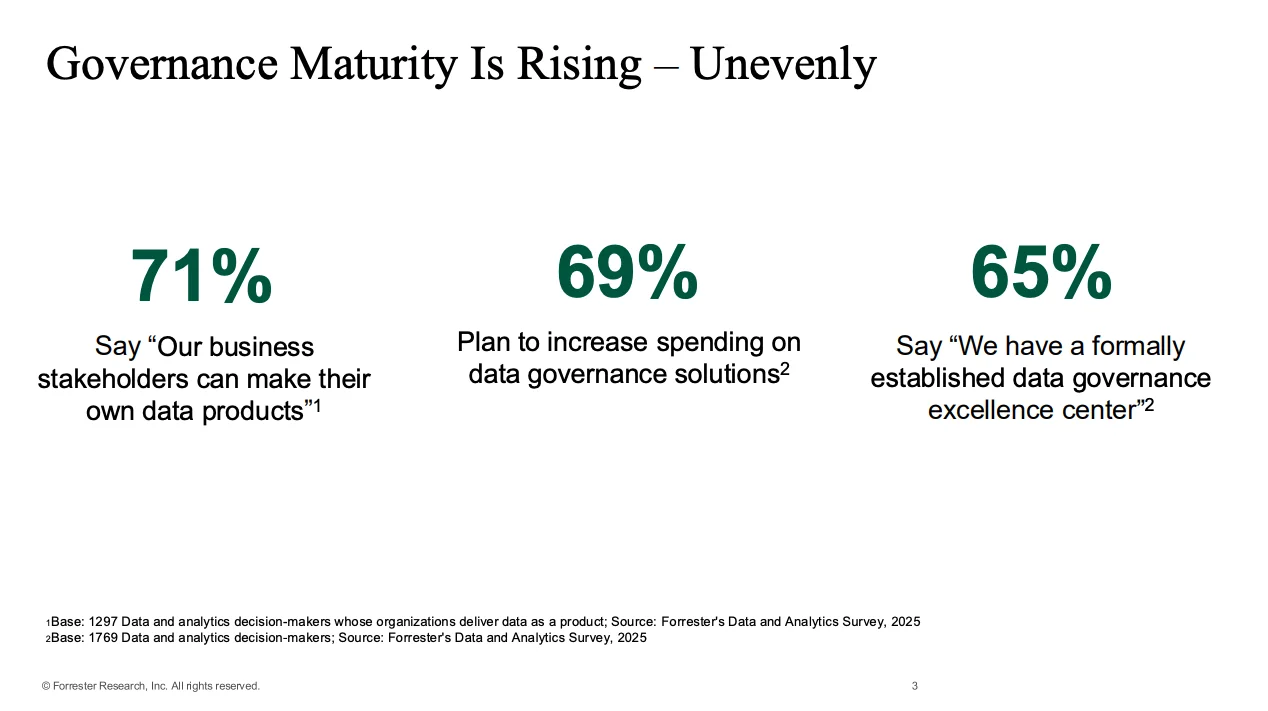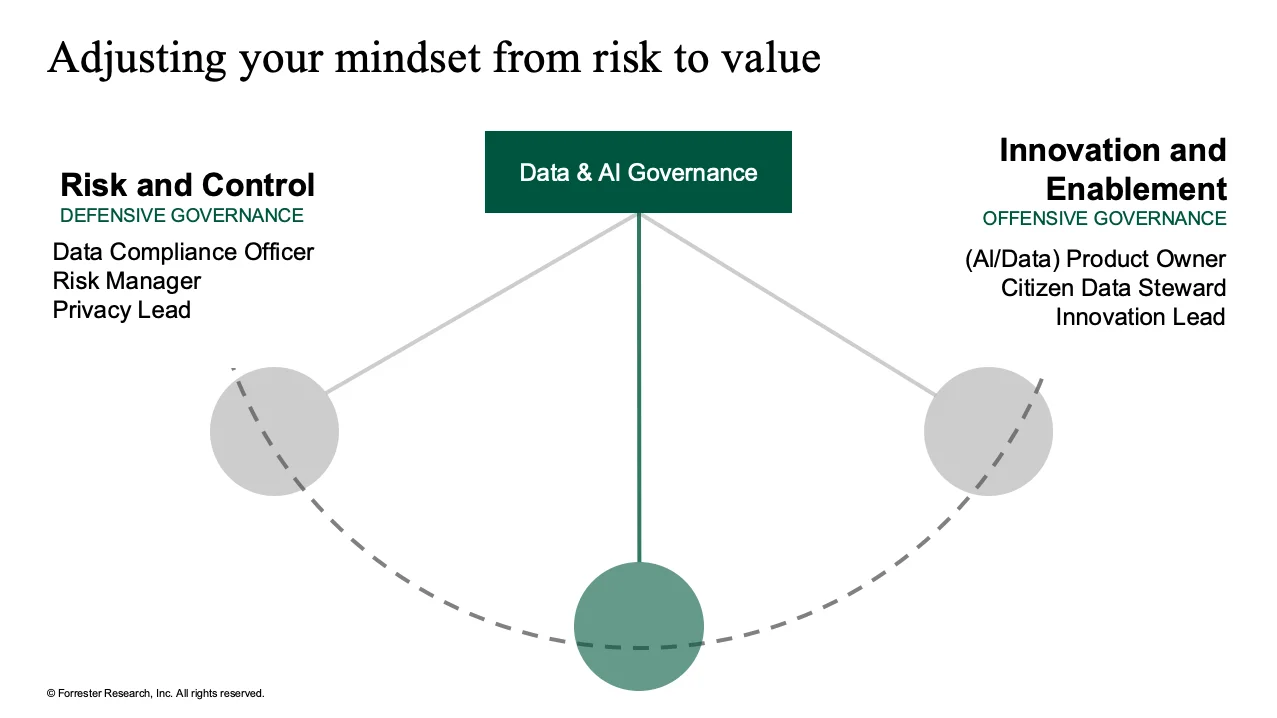Inside Our Conversation with Forrester's Lead Analyst on Data Governance's Defining Moment
Why Governance Teams Are Finally Getting Their Seat at the Table

Last Updated on: September 16th, 2025 | 7 min read
Raluca Alexandru—Forrester’s lead governance analyst—joined us to discuss her latest 2025 Data Governance Solutions Wave report. The open AMA was a candid look at how AI is fundamentally reshaping who gets a seat at the table in data-driven organizations. We learned why a “therapy couch” approach helps governance teams drive adoption, why the smartest companies consolidate their data and AI governance functions, and most importantly, why data governance teams just became the most valuable players in every AI company.
The State of Data Governance: More Connected Than Ever
Permalink to “The State of Data Governance: More Connected Than Ever”According to Forrester’s latest research, data governance is evolving from isolated compliance functions into “a control plane for trust, agility, and AI scale.” The numbers back this up: 71% of Forrester’s survey respondents report that their business stakeholders can now create their own data products — a significant maturity indicator that shows governance teams are successfully doing the “back kitchen” work of data discovery, curation, and quality assurance.
But perhaps more telling is that 65% of companies have established a data governance excellence center, the highest number Forrester has seen in recent years. The reason? AI’s spotlight has finally illuminated what governance professionals have known all along: you can’t build trustworthy AI without solid governance foundations.

However, Alexandru noted that this progress is happening unevenly across organizations, depending on factors like internal organization of governance teams and programs, tool adoption levels, and how much leadership support they have for advancing their governance initiatives.
These disparate realities are creating ripple effects across four key aspects of modern governance: how teams drive adoption, how they measure success, how they’re restructuring around AI, and how they’re preparing for an agentic future. Here’s what Alexandru shared about each.
On Adoption: The Secret is Listening
Permalink to “On Adoption: The Secret is Listening”When it comes to governance adoption, Alexandru’s advice is refreshingly simple: “The secret to adoption is going to potential end users and saying, ‘I’m here to help you. What’s your problem?’”
Like a “therapy couch” approach, start with listening sessions rather than policy rollouts. The most successful governance programs begin not with technology implementations, but with understanding business needs and demonstrating early value through small, targeted use cases.
“You can call them literacy sessions, workshops, or you can just call them ‘I want to hear what your problem is, and I’m here to help you,’” Alexandru explained. “That’s the approach that I see as the secret to adoption.”
This aligns perfectly with what we’ve observed at Atlan: our most successful customer implementations start with extensive user interviews and discovery sessions. In fact, we’re codifying this approach into what we call the Atlan Blueprint, which we’ll be publishing as a comprehensive guide for the first time at our upcoming Re:Govern conference.
On Success Metrics: Focus on Trust, Not Traditional ROI
Permalink to “On Success Metrics: Focus on Trust, Not Traditional ROI”It wouldn’t be a governance Q&A without tackling the perennial question of governance ROI…Alexandru was upfront about no one magic metric fitting all. “Data governance success metrics is a whole new world of unknown areas, I would say.”
But, her favorite go-to metrics focus on data literacy and trust — measurements that become even more critical in the age of generative AI. “Trust is even more important with GenAI when the literacy barrier is lowered but trust remains low” she noted. With hallucinations and responses lacking context, trust in data is dropping and it’s up to governance programs to influence and track its upward trajectory.
These critical trust signals present an opportunity for governance leaders to pioneer new measurement approaches. At Re:Govern, we’ll be hearing early signals directly from Atlan’s most innovative customers about governance’s measurable impact on AI initiatives — a chance to explore these emerging patterns alongside industry experts in real-time.
AI Governance and Data Governance aren’t two separate jobs
Permalink to “AI Governance and Data Governance aren’t two separate jobs”With rapidly expanding enterprise AI initiatives, many companies are spinning up AI Governance teams. Alexandru’s take? Data governance and AI governance aren’t different jobs — they’re the same job, expanded.
“The main AI governance risk today is that you don’t have data governance in place and now you’re trying to govern AI,” she warned. “You’re searching for that perfect tool but forgetting about the nitty-gritty of the governance kitchen behind it.”
Even more problematic is the trend toward siloing AI governance from traditional data governance. “If you are building an AI model that is being owned by a governance team, you need to be working with them…not fork off those responsibilities to an ’AI Governance team,” Alexandru emphasized.
This convergence presents a golden opportunity. Governance teams that expand their charter to include AI governance suddenly find themselves with “a better seat at the table” because “why governance is important is very clear now in a way it historically hasn’t ever been.”

Alexandru referenced a pendulum in her presentation—swinging between defensive governance (risk and control) and offensive governance (innovation and enablement). That pendulum is currently moving toward innovation, with data governance finally being recognized as an enabler rather than a roadblock.
At Atlan, we’re co-building AI governance capabilities with data governance teams who’ve expanded their charter. Learn how teams are successfully approaching AI governance without creating organizational siloes at Re:Govern, the largest data & AI governance conference.
On Agentic AI: Starting with Purpose, Not Pressure
Permalink to “On Agentic AI: Starting with Purpose, Not Pressure”When it comes to agentic platforms—AI systems that can take autonomous actions —Alexandru cuts through the market hype with a simple question: “Do you really need it? What are your gains?”
Her advice for governance leaders facing executive pressure to “do everything AI” is to start with fundamentals: understand your risk appetite, define what problem you’re actually solving, and determine how much control versus autonomy makes sense for your organization.
“Every conversation I have about agentic AI inevitably goes to human-in-the-loop, where is that needed?” Alexandru observed. The key decision isn’t whether to implement autonomous systems, but how much freedom you’re willing to give the algorithm versus how much orchestration you want to maintain.
This connects to a broader theme from the conversation: “Success builds on partnerships, not just on the tools…Real value comes from strategic guidance, next to feature delivery.” For agentic AI, that means working with vendors who help you navigate these control decisions, not just deliver the technology.
What’s Next for Data Governance Leaders
Permalink to “What’s Next for Data Governance Leaders”Governance teams are at an inflection point. They’re finally getting executive attention, but they’re also facing measurement challenges that don’t have established playbooks. They’re expanding into AI governance without clear role definitions. They’re balancing innovation pressure with risk management in ways that require constant recalibration.
These are the exact challenges that governance leaders successfully navigating these transitions will address together at Re:Govern 2025, where practitioners share what’s actually working in their organizations, not what sounds good in theory.
Ready to dive deeper? Join 6,000+ data and AI leaders at Re:Govern 2025 to hear hard-won lessons from VPs and CDOs at Mastercard, Marriott, and other pioneers solving the exact challenges we explored — and discover what it takes to be ready for the AI era.
Share this article
Atlan is the next-generation platform for data and AI governance. It is a control plane that stitches together a business's disparate data infrastructure, cataloging and enriching data with business context and security.


















